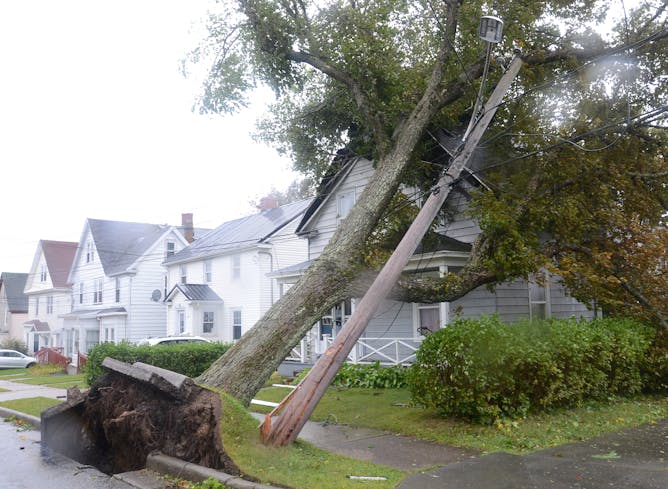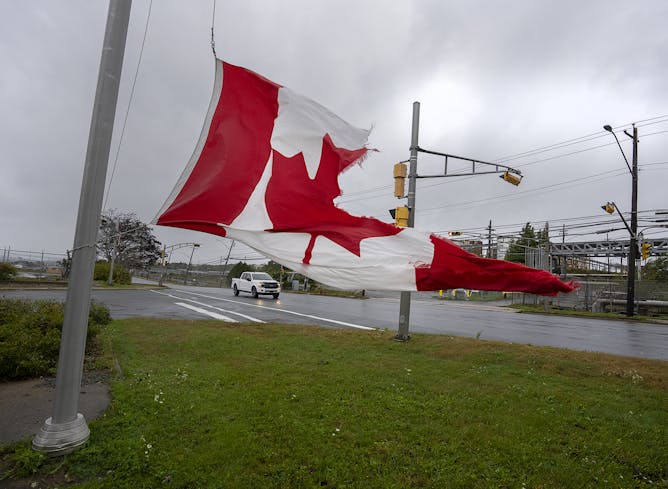|
By the time Hurricane Fiona reached Atlantic Canada, it had been downgraded to a post-tropical cyclone. But it still had a devastating impact on communities in Prince Edward Island, Nova Scotia, Newfoundland and Québec — homes have been destroyed, infrastructure has been washed away and entire communities have been evacuated.
Today in The Conversation Canada, academics explore the relationship between Hurricane Fiona and climate change. Ryan Mulligan at Queen’s University points out that Fiona is likely the first of many more storms to come. “A warmer future increases the probability that more intense storms will reach Canadian coasts,” he writes.
Anya Waite and Eric Siegel at Dalhousie University echo that climate change and ocean warming played a role in Fiona’s impact and intensity. They highlight the need for collaboration among ocean research institutions to help us better predict and respond to future hurricanes, which will increase in frequency and strength.
Also today:
All the best,
|

|
Nehal El-Hadi
Science + Technology Editor
|
|

A tree knocked down by post-tropical storm Fiona leans against a house in Sydney, N.S.
THE CANADIAN PRESS/Vaughan Merchant
Anya M. Waite, Dalhousie University; Eric Siegel, Dalhousie University
Hurricane Fiona is the most devastating storm to hit Atlantic Canada. International collaboration between ocean measurement institutions is necessary to help efficiently plan responses to hurricanes.
|

A Canadian flag waves in the high winds in Dartmouth, N.S. on Sept. 24, 2022.
THE CANADIAN PRESS/Andrew Vaughan
Ryan P. Mulligan, Queen's University, Ontario
Hurricanes don’t usually maintain high wind speeds as they make their way toward Atlantic Canada. But ocean warming may be linked to the increasing intensity of storms like Fiona.
|

Concussion doesn’t just happen in sports or only in teens and young adults; it affects people of all ages and backgrounds.
(Shutterstock)
Keith Yeates, University of Calgary; Charles H. Tator; Cheryl Wellington, University of British Columbia
Canadian researchers are exploring unanswered questions about concussion: How to diagnose it accurately and quickly, how to predict outcomes and promote recovery, and how to prevent it altogether.
|

Remnants of polychrome colouring were scrubbed from recovered ancient Greek sculptures and artists created new all-white marble sculptures seen as continuous with an imagined past.
(Shutterstock)
Beverly Lemire, University of Alberta
Western fashion, laundering and style reflected the racialized politics dramatically shaped by profound global transformations bound up with slavery, colonialism and modernization.
|

TikTok’s popularity continues to rise, while other social media networks have seen a decline.
(Shutterstock)
Philip Mai, Toronto Metropolitan University; Anatoliy Gruzd, Toronto Metropolitan University
The Chinese-owned app TikTok continues its growth as one of the most popular social media networks. After pandemic health measures were lifted, other social media networks saw a decline in use.
|

The Taipei city hall building is lit up with Pride colours during the annual Taiwan LGBTQ event in Taipei, Taiwan, in October 2021.
(AP Photo/Chiang Ying-ying)
Kuan-Wei Chen, McGill University
The cancellation of the WorldPride 2025 event in Taiwan is not only a loss for LGBTQ+ rights in Asia. It’s also emblematic of the influence of authoritarian regimes worldwide.
|
La Conversation Canada
|

En initiant des discussions avec leurs adolescents et en s'intéressant à leur vécu avec empathie, les parents peuvent jouer un rôle important dans le parcours scolaire.
(Shutterstock)
Catherine Cimon-Paquet, Université du Québec à Montréal (UQAM); Jérémie Verner-Filion, Université du Québec en Outaouais (UQO); Marie-Hélène Véronneau, Université du Québec à Montréal (UQAM)
En discutant avec leurs adolescents, les parents peuvent jouer un rôle important dans leur motivation scolaire et dans leur bien-être.
|
Ukraine Invasion
|
-
Basil Germond, Lancaster University
Russia’s rigid military structure and inflexible strategic thinking could well be its Achilles heel in Ukraine.
|
|
|
|
Environment + Energy
|
-
Olivier Kaisin, Université de Liège
Do you know zoopharmacognosy is? Some animals use trees to treat themselves.
|
|
Health
|
-
Michael Head, University of Southampton
France experienced its largest outbreak of ‘native’ dengue this summer. Thanks to climate change, Europe can expect more of the same.
|
|
Politics
|
-
Sara Kamali, University of California San Diego
President Biden denounces white nationalism as once-democratic countries around the world are threatened by increasing political support for this ideology.
|
|
|
|
| |
| |
| |
| |
|
|